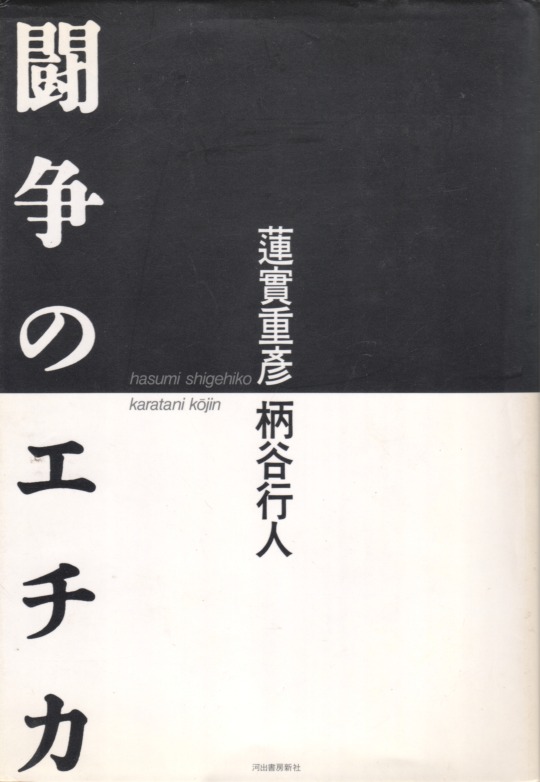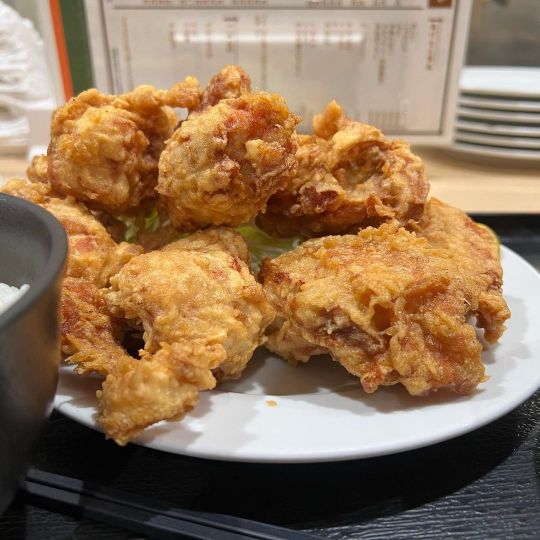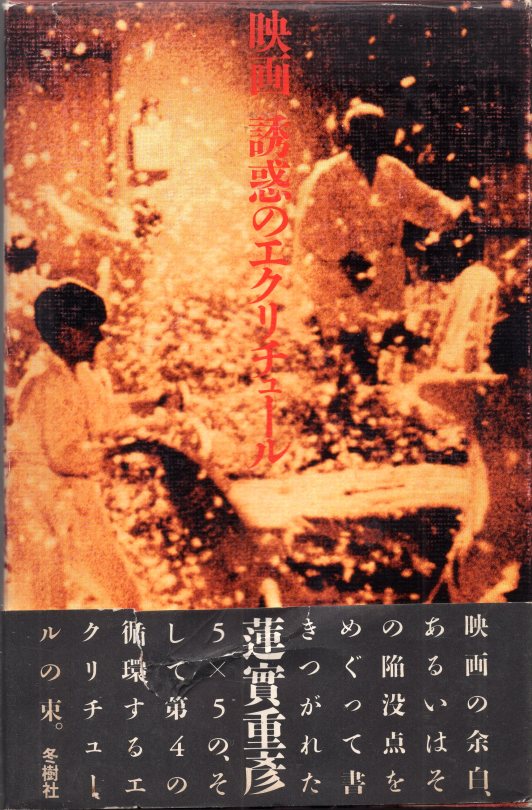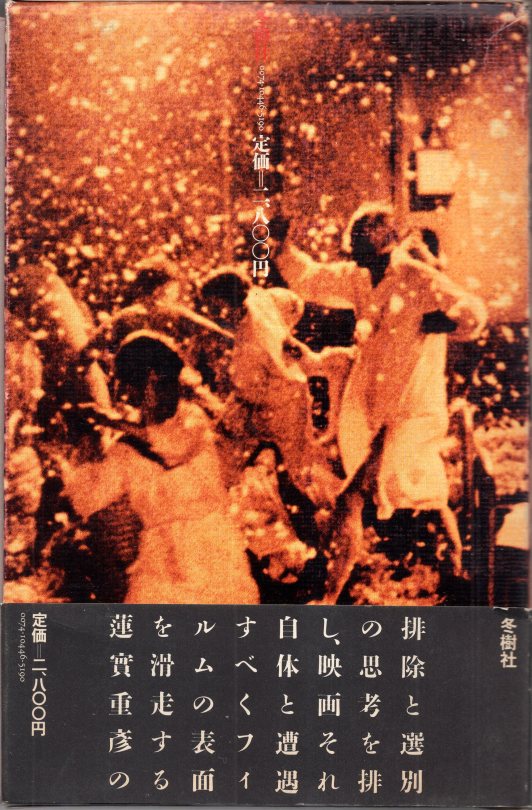#shigehiko hasumi
Text
所謂的引用,容易被認為是缺乏獨創性的模仿,但是對電影而言,引用實際上意味著對電影的肯認,對本來缺乏正統性的電影可說是一種支撐。拼命地反覆才是引用。今天,缺乏電影記憶的電影是不存在的。從被認為具原創性的導演到被認為屬平庸之輩的導演,不管有意無意,所有電影藝術家都在引用前人作品,電影只能是對電影自身的反覆。這就是從高達開始,法國新浪潮作者們明確獲得的唯一電影真理。
蓮實重彥,《電影的記憶裝置》(1979)
14 notes
·
View notes
Text

闘争のエチカ 蓮實重彦・柄谷行人
河出書房新社
装幀=菊地信義
#闘争のエチカ#shigehiko hasumi#蓮實重彦#kojin karatani#柄谷行人#nobuyoshi kikuchi#菊地信義#anamon#古本屋あなもん#あなもん#book cover
8 notes
·
View notes
Photo

I went to "at "A-Get-Monya" in Koenji for an 8-KARAAGE(fried chickens) set meal for 1,100 yen. I arrived around 5:10 p.m., so I killed some time by reading "What is a shot?" by Shigehiko Hasumi at a nearby park. I returned at 5:20 p.m. to find that one person was already waiting in line. Still, the speed of eating has slowed down. I used to eat so fast. I was the first four to enter, the second to be served, and the slowest of the four to finish eating. Like the person who finished first, even though he was the first to eat "Atsu-Giri TON-KATSU" (Thick-cut large loin breaded pork chop set meal)with two extra pieces of fried chicken and another serving of rice. It was frustrating. And sad. 高円寺「あげもんや」で、からあげ8コ定食1100円。 17時10分頃に着いちゃったので、近所の公園で蓮實重彦「ショットとは何か」を読んで時間潰して、17時20分に戻ったら、既にひとり並んでいた。 やっぱりうまいね、「あげもんや」さんの唐揚げ。 それにしても食べるの遅くなってしまった。最初に入った4人、2番目に給仕されたのが僕で、4人のうちで一番遅く食べ終わった。 一番先に食べ終わった人とか、厚切り大カツで唐揚げ2コ追加してライスおかわりしてたのに、一番先に食べ終わっていた。 なんか悔しい。 そして哀しい。 #からあげ #唐揚げ #高円寺 #あげもんや #蓮實重彦 #ショットとは何か #friedchicken #koenji #tokyo #japan #japanesefood #japanesecuisine (あげもんや) https://www.instagram.com/p/ChdU3nevnzJ/?igshid=NGJjMDIxMWI=
2 notes
·
View notes
Photo

三宅唱・蓮實重彦『ジョン・フォードと『投げること』完結編』 at 映画美学校試写室 Sho Miyake & Shigehiko Hasumi ‘Throwings in John Ford’s movies’ (Definitive edition) クソオモロかったze! ヘンリー・フォンダの投げ方俺はいいと思うけどな。 https://instagr.am/p/Cs5-7ZvS0aC/
0 notes
Text
2023/06/13 English
BGM: 真心ブラザーズ - 空にまいあがれ
Reading Shigehiko Hasumi's book, I found an interesing episode in it. In this book, Hasumi writes about the scene he had watched on TV. In that TV, there had been boys who had spoke foreign language fluently. They had confessed a lot to other foreign people. Hasumi describes their attitude as using the words "too diligently"... and he ends this essay with this conclusion. "Although you have great confidence enough about your skill of foreign languages, you shouldn't declare your opinions in those foreign languages". "Because if you try to declare one cluster of your thoughts toward other people's will by speaking that foreign language, people would become too seriously. And that seriousness would lead the person to the huge dishonesty in contrary". In other words, Hasumi writes critically about the attitude of those boys who had tried to speak great opinions in foreign language. They were just too "diplomatic"... And this suggestion by Hasumi is a really great opinion I guess. Can I be free from that idiotic attitude when I speak English as my second language? I am also "diplomatic" to others?
From Hasumi's this opinion, I think that "Even if it is in foreign language or Japanese, we have to accept the fact that confessing ourselves to the world would be funny basically". I guess that this journal I have been writing is also stupid. Although no one asked me to do this, I can't stop writing this and show to other readers. But I don't think that this stupidity must be prohibited (and in my opinion, even Hasumi won't say it must be bad). Indeed, this is stupid, but you should say what you want to say... But if there could be added the factor of "speaking by foreign language", then it would become funnier. Me, when I speak English, then I become more cheerful and frank. Or I even become more "diplomatic". Therefore as Hasumi says I am just a "funny" person. Where could this come? Indeed, I hear that other people can feel this change in themselves if they start speaking foreign language.
Then, speaking foreign language would mean that another personality starts working from zero in ourselves. And that could work as a "diplomatic" one. The fun Hasumi had pointed out might come from there. Of course, we say counter opinions to Hasumi. Are "seriousness" or "stupidity" so bad? Indeed, the cynicism like Hasumi is important, but I love myself. I tend to become to diplomatic and serious, but I love myself beyond those problems... This Hasumi's book is really smart and interesting one for me. TBH I had read this book when I was a college student. But at that period I wasn't learning English as serious as now, so I couldn't understand how severe and bitter the learning of English in our real life is. What kind of suggestions will this book give me?
This evening I went to the English conversation class. At there, today we talked a lot about the topic of enjoying nature. In this Shiso city, and anywhere in Japan. There are a lot of site to enjoy that rich nature... And also the world's nature. I talked about Momiji Yama near my house. Recently I had been to there and enjoyed fresh greenery of maple leaves... And I got surprised how fluent I could speak English. This made me think about what Hasumi had said to us again. Probably Hasumi had said to us that it must be "suspicious" when we speak something fluently like this. We can't control the skill of foreign language. But we almost can speak freely from our mouths. Actually, this thinking will lead me to think that learning foreign languages must be enigmatic. Returning to that class, I thought that my thought(way of thinking) was "refreshed" by enjoying other peoples' English. So I could feel a certain happiness.
0 notes
Photo


Creepy (偽りの隣人), 2016
dir. Kiyoshi Kurosawa
(pics are press stills from internet)
via:
Hubert Niogret, in his review of Kiyoshi Kurosawa’s Creepy in Positif (July/August 2017), suggests: “There is always, in this director’s work, a particular view of social behaviour in this country of Japan where rules are numerous – above all when it comes to politeness, and the civil exchanges between individuals.”
Shigehiko Hasumi has praised the work of his former student by claiming: “Kiyoshi Kurosawa always finds the right distance from which the camera can observe the scene.” This means more than that the direction is always economical and lucid. Rather, the camera expresses the deepest logic of events by either mimicking or violating the reigning social conventions of distance or proximity between people. The more that the everyday world comes off its axis, the more elaborate and expressionistic his style becomes.
- Cristina Álvarez López, Adrian Martin
...
1 note
·
View note
Photo



Shigehiko Hasumi, Kiyoshi Kurosawa and Shinji Aoyama.
68 notes
·
View notes
Text
2022/04/14 English
Once an ex-friend said to me "why don't you start getting welfare and live easily without any labor?". Indeed, it must be a smart way to live on. Without working, being a 'parasite' to this country or my parents. But I don't want to be like that. Maybe I believe that working has a certain value somewhere in my mind. But I think that's not enough. For me, working is not such an abstract act. Wearing my uniform, entering my workplace, moving things actually, and talking to someone. Working is a cluster of those things. And through those actions, I commit to this society. Probably I want to feel those activities actually.
This morning, I went to my workplace and started my work even if I had had the feeling that I wanted to stay home and lie on my bad. Then, my mood started following my body's movement. I could grip the natural flow with the feeling of my work and my mind getting together and starting making. I can call it 'magic'. Basically, I don't like the work. As I always write, I don't have any professionalism. But if I am needed, I want to answer that needing and help them. This might be from the essays by Susumu Sogo I always read.
I'm reading Shinji Aoyama's "Turtles in Takaragaike don't sink". Sometimes his writing gets difficult and intelligent as Shigehiko Hasumi haunted him, but basically, it's clear and easy to read. Shinji Aoyama is a person who made many great movies and also wrote novels that are praised by many critics. I should read them. Touching various movies and watching interesting TV programs, he watched the real world as a creator. It shows that kind of activist figure. How did he spend the time in the 'later' period of his life? I should read this carefully.
I'm thinking about Naomi Kawase's speech at Tokyo University. I won't blame her as she said a bullshit thing. The 'evil' we think might be a 'justice' by others? We have to do such relativization (through that act, we can ask about the 'justice' we rely on again). But if we did that kind of relativizing too much, we could treat nothing as it must be evil (for example, we should say that massacre of ordinary people must be prohibited). We have to say that evil is basically evil. That's all I guess. I remember Haruki Murakami's 'the egg and the wall'. Like Murakami's speech, Kawase's one might be 'used' easily by anyone. Yes, she was naive at that point.
0 notes
Text
2022/03/25 English
I borrowed Hideki Maeda's "The pleasure of Yasujiro Ozu" and Yoshishige Yoshida's "Anti-cinema of Yasujiro Ozu" at a library. I've read several books about Yasujiro Ozu and especially like these two books besides Shigehiko Hasumi's book. I read Maeda's book and found he tries to criticize Ozu's movies with the keyword "plant-like". Ozu celebrates every day's refrain and lives steadily without any material and "animal-like" desire. How can I say "plant-like" as a more natural English word? It might not be the same as "botanical".
I'm also interested in Ozu's "plant-like" aspect. Ozu's life contains the severe experience as he had to go to war. He might be able to look at war or our life as bird's eyes because of that severe duty. I don't want to live with material desires for women and money too (Yes, indeed it is a very 'human' desire). I feel sympathy for Ozu because of that point. I want to watch Ozu again.
I heard that Shinji Aoyama had passed away. I talked with a friend in Kyusyu about this topic. I have never understood Aoyama's movies except "Eureka", but I can see that he has left a lot of heritage in Japanese cinema. Writing like this, I want to watch "Eureka" again. But Aoyama must try to go out of that stage of "Eureka". He tried to progress more. I couldn't see the progress and that's my limit. The friend said that Aoyama was just an ordinary, warm person who never show himself as a maestro. I watch Aoyama's movies if I get time. R.I.P.
Today I listened to Ocean Colour Scene all day. When I listen to their songs, I remember the TV program "Cinema daisuki!" on Yomiuri TV. Their songs were used at that program. At that time I had no interest in movies so I felt that it was in another world. I had never imagined that I would go into the cinema pond. I started watching movies since 40 years old (yes, old enough), and now I talk about Ozu. People changes. I guess I will watch movies and everything goes like this.
0 notes
Text
2022/03/24 English
It was a good day again. I did my work and started reading Yoshikichi Furui's "Nogawa" during the afternoon break. Reading Yoshikichi Furui makes me calm. I feel like doing some meditation by reading his words. Like connecting to higher things. He had already passed away so I can't read his new novels. Who are the authors I wait for their new novels? I always want to read Haruki Murakami, Kazushi Hosaka, and Toshiyuki Horie's new novel. Recently I lost any interest in fresh new writers' novels. If I read Kenichiro Isozaki, I might find something new.
I'm thinking that I will watch Yasujiro Ozu's movies again. The articles about Ozu by Shigehiko Hasumi, Kishige Yoshida, and Hideki Maeda make me feel that so. I want to ask for the meaning of this life with Ozu's philosophy in his movies. How about "Tokyo Story"? I have no tactics. I just read what I want and have no deep thoughts or plans. Nowadays I read Yoshikichi Furui and Kazushi Hosaka, and it is because I want to think about what is life. People might say I am too young to ask such a question.
Touching old novels and movies again, and writing my journals with what I gained from them. Life goes on. I do almost the same activities so I feel like I can't make signs of progress. I want to do something different. In these few months, I had never watched any movies so I want to watch Ozu or Mikio Naruse as a piece of my routine. When I was young, I was basically a snob so wanted to follow 'the trend' and read 'light novels'. But recently I rarely use Twitter. I follow no trends. That might be the meaning of getting older.
Reading Yoshikichi Furui, watching Yasujiro Ozu, and listening to Yosui Inoue. I don't care what other people say about me. I just do what I want, therefore I follow these creators. The word Judith said to me "Thank you for being you" is still alive. Ah, it's good that I start reading Montaigne's "Essays" because I want to follow Eric Hoffer's manner. Step by step, I go out from the trend of the world. That means I'm getting free more and more. That might show that I'm getting to be alone, but comfortable.
0 notes
Text
2022/03/21 English
I read Kazushi Hosaka's "Battle at the dawn". Hosaka's world has been getting deeper and deeper step by step. I feel that he is a reliable author. Men's homosocial playing, the feeling of love for women, and thought about the mystery of cats and the world. It is quite awesome that he describes the scenery of the park very well. I thought that this world can have such rich information. Hosaka watches the world with great concentration. According to my personal reading experience, this book reminds me of Le Clézio and Sartre's "Nausea". Or it also reminds me of Yasumi Tsuhara's "Penis". But this might not be correct.
After that, I started reading Yoshikichi Furui's "Talking about literature together". In this collection of dialogue, he talks with great intelligence as Gen Kida, Takeshi Yourou, and Shigehiko Hasumi evenly. I thought that I could understand his mystery or enigma of creation if I read his words, but I still couldn't understand. But I will read "Nogawa" or "Seiji" even if I couldn't understand. I feel respect for him because he kept creating short novels of his world stoically by exploring his memories. This author is also the man who has progressed with his books one by one.
Is this life? I thought so. Before reading the books, I felt depressed because I read books for killing the boredom until I will die. Yes, I think about various things but I will die in the end... But if I started reading "Battle at the dawn", the words come into my brain smoothly. I even thought that I was living for reading this book exactly. Yes, maybe I have to think "what is life" in my head. But living actually in this world and getting wound with enjoying life is also important. Real brings us the one and only rich experiences.
By the way, why do I read books? What do I want to do with those books? People may think that I'm studying, but I don't have such a purpose. I don't think that drinking alcohol or watching TV is pleasant, so reading books and thinking. I spend time in such a way because I can't enjoy it in another way. But I have kept on doing reading so my style has been made. Oh, that is also life. If the library opens, I go there and borrow the beginner's guide of Heidegger's philosophy, or I should challenge "Being and Time".
0 notes
Photo

169 notes
·
View notes


